- Clone
- 11-5/CRTAM (See other available formats)
- Regulatory Status
- RUO
- Other Names
- Class I-restricted T cell-associated molecule
- Isotype
- Rat IgG2a, κ
- Ave. Rating
- Submit a Review
- Product Citations
- publications
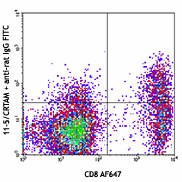
-

C57BL/6 mouse splenocytes were stimulated with immobilized TCR-β (clone H57-597), then stained with CD8 Alexa Fluor® 647 and purified CD355 (clone 11-5/CRTAM) (top) or rat IgG2a, κ isotype control (bottom), followed by anti-rat IgG FITC. -

| Cat # | Size | Price | Quantity Check Availability | Save | ||
|---|---|---|---|---|---|---|
| 142002 | 100 µg | 282 CHF | ||||
Class-I MHC-restricted T-cell associated molecule (CRTAM), designated as CD355, is an Ig domain like type I transmembrane receptor, which belongs to the nectin family. In the immune system, CRTAM is strictly expressed on activated NK cells and activated CD8-positive T cells. By binding its ligand Nectin-like molecule 2 (Necl2), CRTAM plays an important role in mediating cell adhesion and migration.
Product DetailsProduct Details
- Verified Reactivity
- Mouse
- Antibody Type
- Monoclonal
- Host Species
- Rat
- Immunogen
- CRTAM extracellular region-human IgG Fc fusion protein
- Formulation
- Phosphate-buffered solution, pH 7.2, containing 0.09% sodium azide.
- Preparation
- The antibody was purified by affinity chromatography.
- Concentration
- 0.5 mg/ml
- Storage & Handling
- The antibody solution should be stored undiluted between 2°C and 8°C.
- Application
-
FC - Quality tested
WB - Reported in the literature, not verified in house - Recommended Usage
-
Each lot of this antibody is quality control tested by immunofluorescent staining with flow cytometric analysis. For flow cytometric staining, the suggested use of this reagent is ≤1.0 µg per million cells in 100 µl volume. It is recommended that the reagent be titrated for optimal performance for each application.
- Application Notes
-
Additional reported applications (for relevant formats) include: Western blotting1.
-
Application References
(PubMed link indicates BioLegend citation) -
- Arase N, et al. 2005. Int. Immunol. 17:1227. (WB)
- RRID
-
AB_10899412 (BioLegend Cat. No. 142002)
Antigen Details
- Structure
- 75 kD homodimer, nectin family, Ig superfamily
- Distribution
-
Activated NK cells and activated CD8-positive T cells
- Function
- Cell adhesion, migration
- Ligand/Receptor
- Nectin-like molecule 2
- Cell Type
- NK cells, T cells
- Biology Area
- Cell Adhesion, Cell Biology, Immunology, Innate Immunity, Signal Transduction
- Molecular Family
- Adhesion Molecules, CD Molecules
- Antigen References
-
1. Takeuchi A, et al. 2009. J. Immunol. 183:4220.
2. Yeh JH, et al. 2008. Cell 132:846.
3. Arase N. 2005. Int. Immunol. 17:1227.
4. Boles KS, et al. 2005. Blood 106:779.
5. Galibert L, et al. 2005 J. Biol. Chem. 280:21955.
6. Kennedy J, et al. 2000 J. Leukoc. Biol. 67:725. - Gene ID
- 54698 View all products for this Gene ID
- UniProt
- View information about CD355 on UniProt.org
Related Pages & Pathways
Pages
Related FAQs
Other Formats
View All CD355 Reagents Request Custom Conjugation| Description | Clone | Applications |
|---|---|---|
| Purified anti-mouse CD355 (CRTAM) | 11-5/CRTAM | FC,WB |
| PE anti-mouse CD355 (CRTAM) | 11-5/CRTAM | FC |
| APC anti-mouse CD355 (CRTAM) | 11-5/CRTAM | FC |
| Biotin anti-mouse CD355 (CRTAM) | 11-5/CRTAM | FC |
| PerCP/Cyanine5.5 anti-mouse CD355 (CRTAM) | 11-5/CRTAM | FC |
| PE/Cyanine7 anti-mouse CD355 (CRTAM) | 11-5/CRTAM | FC |
Compare Data Across All Formats
This data display is provided for general comparisons between formats.
Your actual data may vary due to variations in samples, target cells, instruments and their settings, staining conditions, and other factors.
If you need assistance with selecting the best format contact our expert technical support team.
-
Purified anti-mouse CD355 (CRTAM)
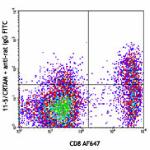
C57BL/6 mouse splenocytes were stimulated with immobilized T... 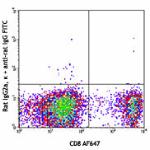
-
PE anti-mouse CD355 (CRTAM)
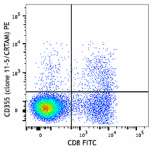
C57BL/6 mouse splenocytes were stimulated (overnight) with i... 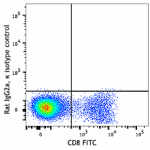
-
APC anti-mouse CD355 (CRTAM)
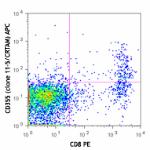
C57BL/6 mouse splenocytes were stimulated (overnight) with i... 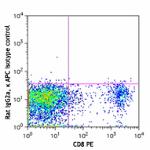
-
Biotin anti-mouse CD355 (CRTAM)
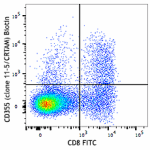
C57BL/6 mouse splenocytes were stimulated (overnight) with i... 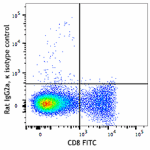
-
PerCP/Cyanine5.5 anti-mouse CD355 (CRTAM)

C57BL/6 mouse splenocytes were stimulated (overnight) with i... -
PE/Cyanine7 anti-mouse CD355 (CRTAM)

C57BL/6 mouse splenocytes were stimulated (overnight) with i...
 Login / Register
Login / Register 








Follow Us